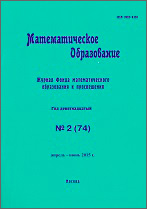|
|
Mathematical Education, 2019, Issue 4(92), Pages 63–75
(Mi mo687)
|
 |
|
 |
From the history of mathematics
On the knowledge in the XIII–XVI centuries of the relationship of Fibonacci numbers with the golden ratio
A. N. Kovalev
Journal of Mathematical Education
Abstract:
It is suggested that the use of Divine Proportion (Golden Ratio) by artists and architects, starting from the 13th century, could lead to the calculation of suitable fractions for the Phidia number, and, as a consequence, to the discovery of its connection with Fibonacci numbers.
Keywords:
Fibonacci numbers, Phidias number, golden ratio, triangulation, Cassini formula.
Citation:
A. N. Kovalev, “On the knowledge in the XIII–XVI centuries of the relationship of Fibonacci numbers with the golden ratio”, Math. Ed., 2019, no. 4(92), 63–75
Linking options:
https://www.mathnet.ru/eng/mo687 https://www.mathnet.ru/eng/mo/y2019/i4/p63
|

| Statistics & downloads: |
| Abstract page: | 137 | | Full-text PDF : | 283 | | References: | 19 |
|




 Contact us:
Contact us: Terms of Use
Terms of Use
 Registration to the website
Registration to the website Logotypes
Logotypes








 Citation in format
Citation in format 